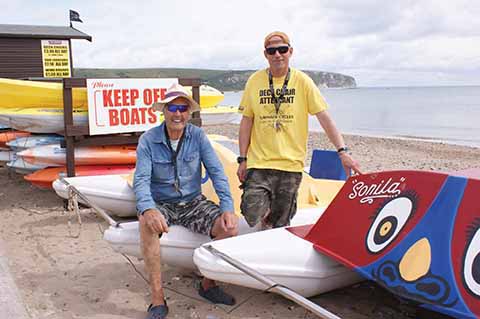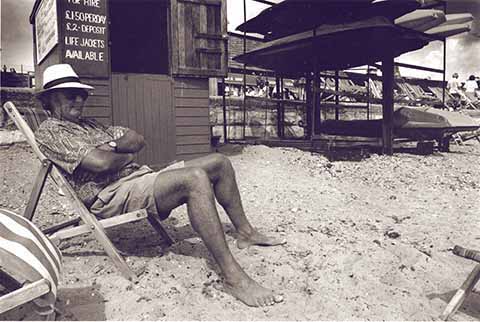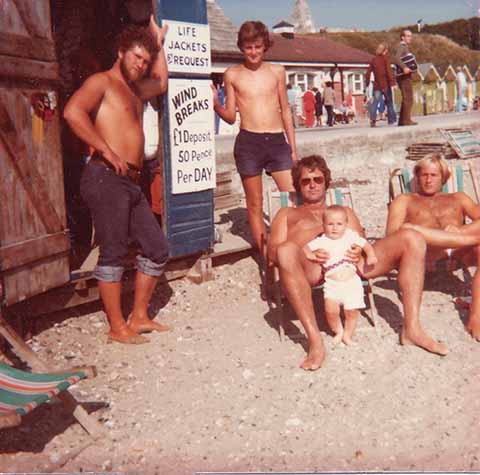Life’s a beach
Nick Churchill talks to Swanage’s deckchair supremo, Barry Wiggins
Published in September ’19

Barry and Carlo Wiggins take a break from their deckchairs – ‘I’ve had a few pinched fingers to deal with,’ admits Barry. ‘Sun cream in the eye, that’s the real hazard,’ laughs Carlo.
‘I’ve seen a lot of changes over the years,’ sighs Barry Wiggins as he sits in his hut on Swanage beach and stares out to sea. ‘Everything’s different. Well, nearly everything. One thing that hasn’t changed is the view; the Isle of Wight, that hasn’t changed.’
Barry has known the view from Swanage beach for as long as he’s had eyes to see. He was born and bred in the town, his grandmother used to work in the ice cream kiosk at the Mowlem end of the beach and his Auntie Pauline worked in the kiosk at the other end. Running between them, little Barry made such a nuisance pestering for money for ice creams that by the age of four or five he was earning sixpence a week in the season by clearing a path up and down the beach for the pony and donkey rides. ‘Eventually, the old guv’nor who ran the rides gave me my first proper job on the beach and I’ve hardly left it since,’ he smiles.
After working a year on the deckchairs and pedalos for Swanage Urban District Council, in 1972 Barry took over the concession for himself. ‘The council had run the beachfront trading, then they put it up for tender as the old urban district was going to be taken in by the new Purbeck District Council. Now that’s gone, too,’ he muses.
He paints a vivid picture of the beach and its visitors as they were almost fifty years ago: ‘In those days the coaches used to arrive packed with holidaymakers and they pulled up all along Shore Road. Everyone got out and went straight onto the beach, got their deckchairs and formed themselves into circles – all the way along the beach, all these groups in circles. Even in the drizzle. We had a team of five lads at the height of it, with the beach split into three sections, and it took each of them an hour to collect the money in his section.’
Today he has about 250 yellow and blue striped deckchairs and five pedal boats, plus a few sun loungers, but in the 1970s Barry worked 3000 deckchairs and a small fleet of fifteen or twenty pedalos. On a good day in peak season, it wasn’t unusual for the whole lot to be out at once. He’s no stranger to hard graft, but it was some going to round it all up again at the end of the day. ‘Oh, we worked. Well, from Easter to the end of September we did,’ he laughs. ‘Mind you, come the winter there were chairs to repair or to sand down, new canvasses to go in, holes in the floats that needed patching with fibreglass, there was always something to do. There still is today. I’m meant to be retired, but I’m here most days. What else am I going to do?’
He goes on, ‘But I’ll tell you this: I always had a queue of students wanting to work here in the summer. Not now, though, and we don’t need more than one or two in any case. Generally speaking, I don’t think the youngsters want to work like they used to. I don’t think they need the money, at least not the twenty-five quid a day I can afford to pay them.’
In the early days, Barry worked with David Mellor, the Swanage Grammar School old boy who was MP for Putney from 1979 to 1997 and served in John Major’s Cabinet from 1990 to 1992. ‘He was a good worker, but even then you could tell he was a Conservative – he used to arrive at work with a rolled up newspaper tucked under his arm. I saw him interviewed once and he said he never had as much enjoyment out of work as when he worked on Swanage Beach.’
At least one thing has changed for the better though – the litter. ‘People are so much better than they used to be, there’s hardly any litter these days,’ offers Barry’s son, Carlo, as if to draw a line under his Dad’s nostalgic ruminations. ‘I’ve been coming here since I was a baby and, going right back as long as I can remember, I used to wonder about the mentality of people who would sit there all day, have a fish and chip tea and then, when they’d all finished, just get up and leave their rubbish on the beach. In those days there were bins on the beach as well. You see it all from this hut and nowadays I’d say ninety per cent of people walk away with their rubbish. Dog muck is the same: they get the poo bags out. There’d be an outcry if someone left their dog mess on the prom.’
Then Barry reminds Carlo how for years the beach was nothing but golden sand, not littered with pebbles dredged up by storm waters as it has been the last couple of years. ‘We used to get stones washed up, but then we’d get the high tides that would take them away again,’ Barry explains. ‘Like everyone, I remember childhood summers being longer and hotter and drier than they are now, but having seen a fair few summers from Swanage beach, I’d say things are pretty much the same as they’ve always been. If anything, we don’t have to pull all the chairs and boats off the beach like we used to. The sea still comes up to the hut sometimes, but in past years we’ve had boats floating over the wall and I haven’t seen that for a long time.’
For Barry, working on the beach is a way of life. ‘You get into a pattern of it,’ he says. ‘It’s all day every day in the season, then take it easier in the winter. Carlo couldn’t settle in a year-round job. He kept coming back here, so it was obvious he should take over. We do this together from May to September, then he has a printing business that sees him through winter. My other son, Angelo, has a cocktail bar in Swanage. I love the place. It suits me. I don’t want to be anywhere else, never have done. In any case, at 77 I reckon it’s a bit late now even if I did!’



